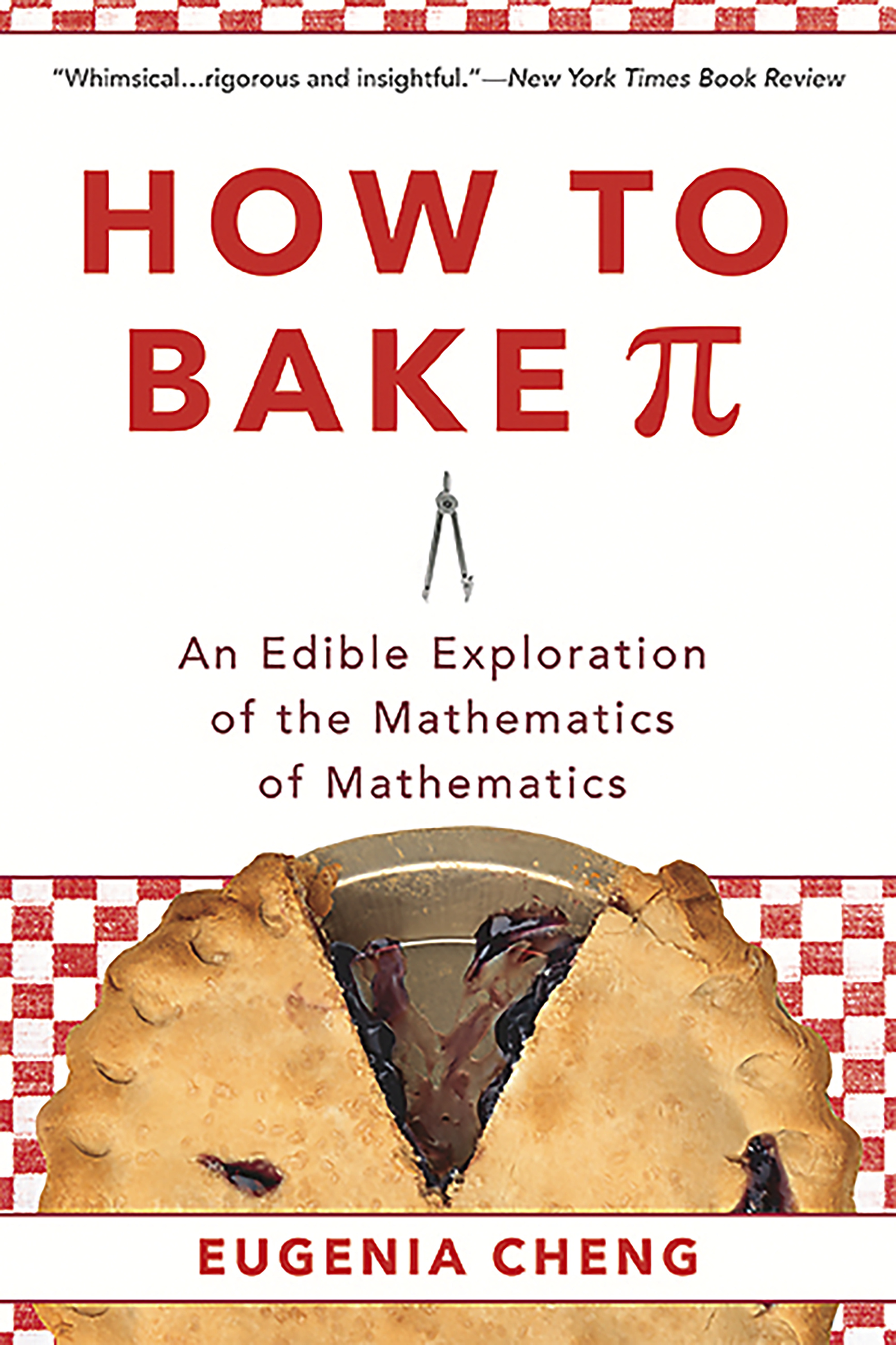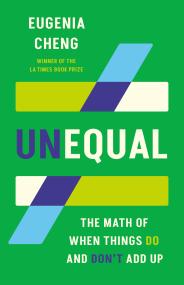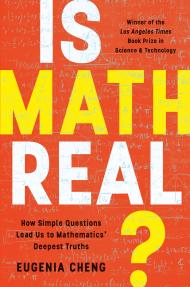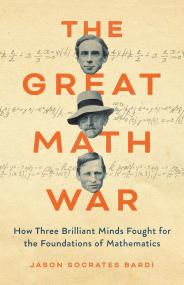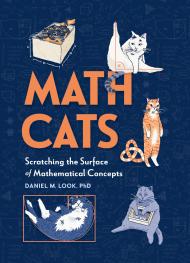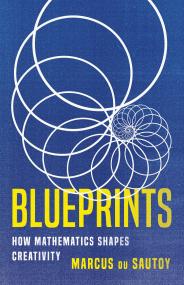By clicking “Accept,” you agree to the use of cookies and similar technologies on your device as set forth in our Cookie Policy and our Privacy Policy. Please note that certain cookies are essential for this website to function properly and do not require user consent to be deployed.
How to Bake Pi
An Edible Exploration of the Mathematics of Mathematics
Contributors
Formats and Prices
- On Sale
- May 10, 2016
- Page Count
- 304 pages
- Publisher
- Basic Books
- ISBN-13
- 9780465097678
Price
$19.99Price
$25.99 CADFormat
Format:
- Trade Paperback $19.99 $25.99 CAD
- ebook $11.99 $14.99 CAD
Buy from Other Retailers:
What is math? How exactly does it work? And what do three siblings trying to share a cake have to do with it? In How to Bake Pi, math professor Eugenia Cheng provides an accessible introduction to the logic and beauty of mathematics, powered, unexpectedly, by insights from the kitchen. We learn how the bechamel in a lasagna can be a lot like the number five, and why making a good custard proves that math is easy but life is hard. At the heart of it all is Cheng’s work on category theory, a cutting-edge “mathematics of mathematics,” that is about figuring out how math works.
Combined with her infectious enthusiasm for cooking and true zest for life, Cheng’s perspective on math is a funny journey through a vast territory no popular book on math has explored before. So, what is math? Let’s look for the answer in the kitchen.
Genre:
-
"Cheng never quite overeggs her metaphor of the mathematician as chef...and her tone is clear, clever and friendly. Even at her most whimsical she is rigorous and insightful. Potentially confusing ideas are expressed with a matter-of-fact simplicity.... How to Bake Pi is a welcome addition to the popular-math shelf, unusual not only because of its quirky premise but also because Cheng is a woman, a lucid and nimble expositor, and unashamedly proud of her domestic obsessions.... It would be wonderful if this book attracted a new audience to the field. And there's no better ambassador (or dinner-party host, I'd wager) than Eugenia Cheng."Alex Bellos, New York Times Book Review
-
"[A] slyly illuminating dispatch on the deep meaning of mathematics.... Cheng manages to do for us what the mathematician Keith Devlin has said mathematicians do for themselves: she compels us to see numbers and symbols as vivid characters in an ongoing drama, a narrative in which we are alternately observers and participants."Natalie Angier, The American Scholar
-
"[O]ften entertaining...frequently illuminating.... [How to Bake Pi] offers enough nourishment for the brain to chew on for a long time."Columbus Dispatch
-
"Invoking plenty of examples from cooking and baking, as well as other everyday-life situations such as calculating a taxi fare, searching for love through online dating services and training for a marathon, [Cheng] explains abstract mathematical ideas--including topology and logic--in understandable ways.... Her lively, accessible book demonstrates how important and intriguing such a pursuit can be."Scientific American
-
"Combined with infectious enthusiasm for cooking and a zest for life, Cheng's perspective on math becomes this singular book: a funny, lively, and clear journey no popular book on math has explored before. How to Bake Pi...will dazzle, amuse, and enlighten."Gambit Weekly
-
"This is the best book imaginable to introduce someone who doesn't think they are interested in mathematics at all to some of the deep ideas of category theory, especially if they like to bake."MAA Reviews
-
"A curious cookbook for the mathematical omnivore."The Irish Times
-
"Beginning each chapter with a recipe, Cheng converts the making of lasagna, pudding, cookies, and other comestibles into analogies illuminating the mathematical enterprise. Though these culinary analogies teach readers about particular mathematical principles and processes, they ultimately point toward the fundamental character of mathematics as a system of logic, a system presenting daunting difficulties yet offering rare power to make life easier. Despite her zeal for mathematical logic, Cheng recognizes that such logic begins in faith--irrational faith--and ultimately requires poetry and art to complement its findings. A singular humanization of the mathematical project."Booklist, starred review
-
"[A] well-written, easy-to-read book."Library Journal
-
"Cheng is exceptional at translating the abstract concepts of mathematics into ordinary language, a strength aided by a writing style that showcases the workings of her curious, sometimes whimsical mind. This combination allows her to demystify how mathematicians think and work, and makes her love for mathematics contagious."Publishers Weekly, starred review
-
"An original book using recipes to explain sophisticated math concepts to students and even the math-phobic.... [Cheng] is a gifted teacher... A sharp, witty book to press on students and even the teachers of math teachers."Kirkus Reviews
-
"In her new book, How to Bake Pi, mathematician/baker Eugenia Cheng offers a novel, mathematical approach to cooking.... How to Bake Pi is more than a mathematically-minded cookbook. It is just as much a book about mathematical theory and how we learn it. The premise at the heart of the book is that the problem that stops a cookbook from teaching us how to cook is the same problem that makes math classes so bad at actually teaching us to do math."Ria Misra, io9
-
"[Cheng's] book, a very gentle introduction to the main ideas of mathematics in general and category theory in particular, exudes enthusiasm for mathematics, teaching, and creative recipes. Category theory is dangerously abstract, but Cheng's writing is down-to-earth and friendly. She's the kind of person you'd want to talk to at a party, whether about math, food, music, or just the weather.... Cheng's cheerful, accessible writing and colorful examples make How to Bake Pi an entertaining introduction to the fundamentals of abstract mathematical thinking."Evelyn Lamb, Scientific American's Roots of Unity blog
-
"Eugenia Cheng's charming new book embeds math in a casing of wry, homespun metaphors: math is like vegan brownies, math is like a subway map, math is like a messy desk. Cheng is at home with math the way you're at home with brownies, maps, and desks, and by the end of How to Bake Pi, you might be, too."Jordan Ellenberg, author of Shape
-
"From clotted cream to category theory, neither cookery nor math are what you thought they were. But deep down they're remarkably similar. A brilliant gourmet feast of what math is really about."Ian Stewart, author of In Pursuit of the Unknown
-
"What a charming and original book! The central analogy--math is like cooking--turns out to be surprisingly apt and often funny. Light and tasty, yet so, so good for you, How to Bake Pi is a real treat."Steven Strogatz, author of Infinite Powers
-
"With this delightfully surprising book, Eugenia Cheng reveals the hidden beauty of mathematics with passion and simplicity. After reading How to Bake Pi, you won't look at math (nor porridge!) in the same way ever again."Roberto Trotta, author of Starborn
-
"Math is a lot like cooking. We start with the ingredients we have at hand, try to cook up something tasty, and are sometimes surprised by the results. Does this seem odd? Maybe in school all you got was stale leftovers! Try something better: Eugenia Cheng is not only an excellent mathematician and pastry chef, but a great writer, too."John Baez, Professor of Math at the University of California, Riverside
Newsletter Signup
By clicking ‘Sign Up,’ I acknowledge that I have read and agree to Hachette Book Group’s Privacy Policy and Terms of Use
